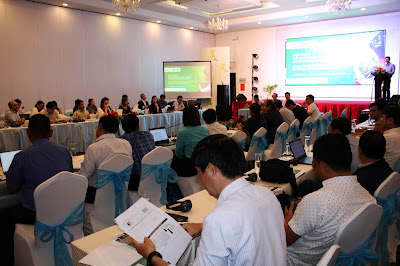Can Tho City, Vietnam, 01 September 2023—The International Rice Research Institute (IRRI), in collaboration with Vietnam’s Institute of Policy and Strategy for Agriculture and Rural Development (IPSARD) and Department of Crop Production (DCP), conducted the Multi-stakeholder Dialogue on Carbon Markets in Agriculture Workshop on 24-25 August 2023.
The workshop aimed to identify priorities for inclusive engagement in the carbon market and define the gaps and technical support for the carbon accreditation of Vietnam’s rice sector. This multi-stakeholder dialogue was also organized to provide a platform for relevant stakeholders to exchange knowledge, information, and experience, contributing to preparing the sector’s readiness to participate in domestic and international carbon markets.
Vietnamese and international experts presented the strategy and roadmap for the development of carbon markets, experiences in engaging and accessing carbon credit schemes, and market modalities for carbon offset markets.
The experts discussed measurement, reporting, and verification (MRV) requirements and tools to support carbon markets and sustainable agriculture transitions in the rice sector and provided insights on the technical needs for developing a comprehensive multi-level (i.e., national, sector, sub-sector, and project levels) MRV system for Vietnam. Digital solutions to provide technical advice and tools for monitoring and reporting GHG emissions were also presented. IRRI prepared a GHG toolkit with more information on tools to support emission reduction projects and MRV innovations.
“Carbon credits have received a lot of attention recently and both the voluntary carbon market and internal carbon trading schemes require regulatory frameworks and standard operating procedures,” said Tran Dai Nghia, director of the Department of Natural Resource and Environmental Economics Studies at IPSARD.
Participants from the government, research, private, and other interested sectors were introduced to various MRV systems, remote sensing/satellite MRV, aggregate data collection models, process-based GHG models, and apps running on empirical GHG models. The stakeholders also discussed opportunities and challenges in accessing carbon markets for agriculture and the procedures for approval and registration of carbon credit projects in agriculture.
Leading to the next steps, the experts and participants discussed the priorities and guiding path forward for MRV in the rice sector. The participants agreed on the formation of a technical advisory group to be composed of the representatives of the different stakeholders and stressed that the different organizations working on all the aspects of MRV, especially verification, and audit, should be represented in the group.
With DCP as the focal point and IRRI as the lead of the technical advisory group, the group will work on mapping all the related works that need to be done in the development of a national MRV framework and in consolidating contributions (e.g., financial and technical) from all related sectors.
This dialogue also contributes to the government’s proposal Sustainable Development of One Million Hectares of Specialized High Value and Low Carbon Rice Production Areas under the Green Growth Agenda in the Mekong Delta Region up to 2030.
“This event is highly relevant to Vietnam’s recent commitments to reduce emissions from all sectors,” said Dr. Katherine Nelson, a climate change scientist and carbon market specialist at IRRI Vietnam. “IRRI had been working with IPSARD, DCP, and other agencies of MARD to support this transition and to identify ways for farmers to benefit from carbon markets, particularly in the rice sector.”
IRRI and Gold Standard are in partnership with the Business Partnerships Platform of the Australian Department of Foreign Affairs and Trade to scale carbon market access for sustainable rice producers in Vietnam. The workshop was partly supported through the EU-IFAD Agroecological Transitions Digital Tools project.
###
Learn more about IRRI (www.irri.org) or follow us on social media and networks (all links down the right column).



No comments:
Post a Comment